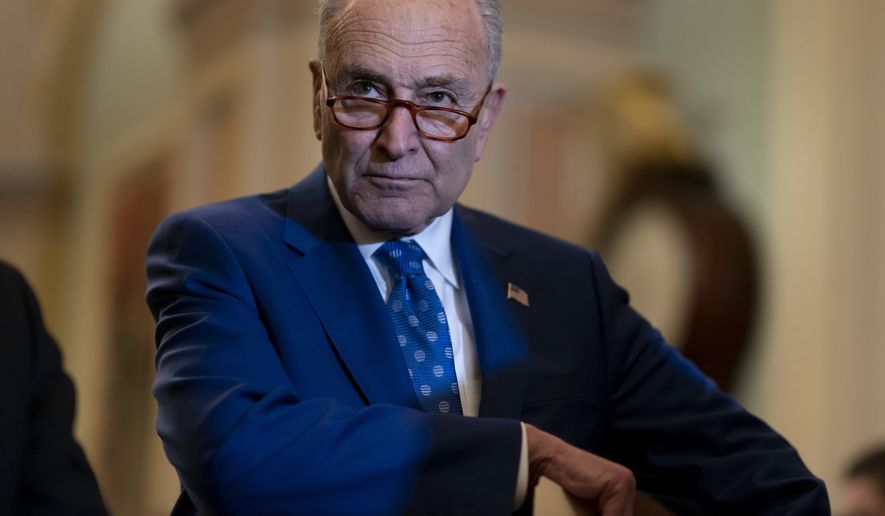The Senate has delayed further consideration of the annual defense bill until after Thanksgiving recess after the two parties failed to gain traction on the long-stalled legislation with just weeks to spare in the legislative calendar.
The impasse on the National Defense Authorization Act (NDAA) adds further pressure on Senate Majority Leader Charles E. Schumer as he stares down a growing logjam of legislative feats to accomplish by the end of the year.
“It is unfortunate that we cannot move forward tonight,” Mr. Schumer, New York Democrat, said late Thursday before the Senate adjourned without a deal. “But, unfortunately, the other side won’t agree. Or some on the other side won’t agree.
“Members on both sides want to get this done, so these delays are unfortunate,” he said. “There is no good reason to keep delaying.”
Mr. Schumer has faced increasing pressure from both sides of the aisle to move the bill to the floor after the Senate Armed Services completed its markup of the legislation this summer.
Senate Minority Leader Mitch McConnell said Democrats had “been distracted from the people’s business,” as they wrestled with President Biden’s multitrillion-dollar social welfare bill.
“The full Senate should have considered, amended and then passed an annual defense authorization bill months ago,” the Kentucky Republican said early last week. “That’s how it normally works. It’s a major bipartisan priority that the Senate majority focuses on, as a matter of basic governance.”
Congress has passed the bill on a bipartisan basis for six decades, making it a popular vehicle to major policy and spending changes in the Defense Department and beyond.
Lawmakers have piled on more than 900 amendments to the already colossal bill in recent weeks, setting the stage for a potentially lengthy process to get the measure over the finish line.
Among the flash points this year is an amendment to strike language already passed by the full House and the Senate Armed Services Committee that would for the first time in history require young women as well as men to register and be subject to the military draft if it is reinstated.
The measure exposed fissures in the Republican Party as the NDAA made its way through the House, and several Senate Republicans have backed an amendment to strike the text from the bill.
The Senate and House versions of the bill also include language to boost next year’s defense budget by $25 billion, a key win for Republicans and a setback for House progressives who fought for a lower spending total.
Sen. Bernard Sanders, the Vermont independent who chairs the Senate Budget Committee, introduced a measure in the Senate to block the $25 billion increase and reduce the Pentagon budget below Mr. Biden’s proposal.
Mr. Schumer also promised to tack on to the Senate version a provision to repeal the presidential authorizations for the use of force for the 1991 Persian Gulf War and the 2003 invasion of Iraq. Critics have long said presidents of both parties have used the authorizations to launch military action far beyond what the original measures called for.
On Thursday, Senate Armed Services Committee Chairman Jack Reed, Rhode Island Democrat, put forward a package that would have allowed the bill to progress with separate up or down votes on 19 controversial amendments offered by members of both parties.
Among the 19 amendments was a measure put forward by Sen. Josh Hawley, Missouri Republican, to strike the language requiring women to register for the draft. The package included Mr. Sanders’ amendment to trim the budget and a measure to repeal the two Iraq war authorizations put forward by Sen. Tim Kaine, Virginia Democrat.
Seven Republicans objected to the deal for not including their amendments, forcing the chamber to adjourn at an impasse.
On Friday, the Senate agreed by voice vote to a package including a single-vote tranche of 57 less controversial amendments split among 27 Democratic, 27 Republican and three bipartisan sponsors, and set final passage in motion after the break.
None of the 19 amendments offered Thursday was included in Friday’s package, but the final bill could still face headwinds before it becomes law.
Once the Senate approves the package, the two chambers will need to smooth out any differences between the two versions before it is sent for Mr. Biden’s signature.
The Senate’s completion of the bill comes on top of a looming government shutdown and debt default, as well as a list of several other priorities Mr. Schumer has committed to making progress on by the end of the year, including voting rights legislation and the Senate chop on social welfare bill that passed the House on Friday.
Mr. Schumer also has committed himself to shepherding the Senate’s sweeping anti-China competition bill to final passage after it stalled in the House and repealing the Iraq war authorizations should the measure not be included in the final passage of the NDAA.
In a recent letter to Senate Democrats, Mr. Schumer acknowledged that the list of items is “considerable” and asked his colleagues to remain flexible “for the remainder of the calendar year.”
“As you can see, we still have much work to do to close out what will be a very successful year of legislative accomplishments,” he said. “I am confident we can get each of these important items done this year, but it will likely take some long nights and weekends.”
• Joseph Clark can be reached at jclark@washingtontimes.com.




Please read our comment policy before commenting.